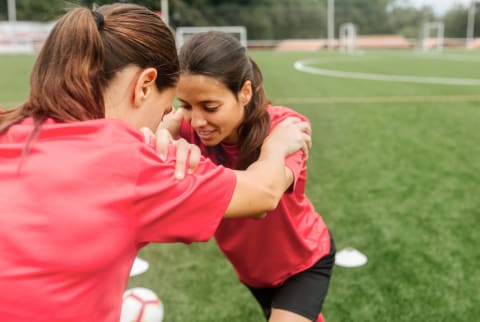Advertisement
To Improve Your Mental Health, Join A Team Sport


I have depression and anxiety. In the midst of a bad bout, it's tough to find the motivation to do much of anything. I do a lot of things to help mitigate that and other symptoms (medication, therapy, acupuncture, exercise, meditation—the works) because no one thing works to make a difference. I employ them all at varying degrees depending on where I'm at with my condition at any given time, but breaking a sweat is one of the things that I keep at a constant because I've learned that it's one of my "prescriptions" that works in direct counterbalance to some of the more difficult days.
According to one study, there might be one additional aspect for us all to be adding to our workouts, though—another person. That's because while it's pretty well-known that mental health conditions and sleep disorders have shown improvement with regular exercise, researchers have now discovered team sports might be the best to choose for physical activity.
Published in the Lancet Psychiatry journal1, the study took a look at surveys from the Centers for Disease Control and Prevention (CDC), where they assessed the mental health of 1.2 million adults. What they found was that across age, gender, education status, and income, people who exercised had fewer of those bad mental health days than people who didn't hit the gym as often. But, in particular, people who played team sports had the fewest bad days of all.
"Some sports might just be hitting on more of those [mental health] elements than other sports," Adam Chekroud, an assistant adjunct professor at Yale's School of Medicine and one of the study's authors, told NPR. "If you just run on a treadmill for example, it's clear that you're getting that biological stimulation. But perhaps there are other elements of depression that you're not going to be tapping into."
The reason is that there are biological, cognitive, and social aspects to mental illness, Chekroud said. In other words, going for a run might affect the biological and cognitive aspects of your condition, but the solo nature of it leaves out the social impact group exercise might make.
It wasn't until more recently that I started to get involved in exercising in a social setting. I am very much someone who likes to hit the gym on her own or go for a run to sort out my thoughts (both beneficial in their own ways). But when I started heading to regular barre classes and signing up for sessions at Orangetheory Fitness, I realized that one of the things I like the most about it was other people counting on me to show up. And it wasn't just about my waistline—that accountability also made it easier to show up when I was having a tough mental health day.
Exercising with a group may also significantly lower your stress levels, according to a study published in the Journal of the American Osteopathic Association last year. Researchers found that even in instances where solitary exercisers worked out longer, they didn't see significant changes in their quality of life or stress levels, while the group exercisers experienced an improved mental state and reduction of stress by 26 percent.
One tried-and-true method for sticking to group exercising is making a date with a friend. It's easier for us to bail on plans with ourselves than it is with a pal. Run groups and local sports organizations can also help you find your crew. Consider also signing up for a new member package at a gym or boutique studio you've been wanting to try.
In my experience, it's also important to take these steps while not in the midst of a bad bout of depression. Instead, start these habits while riding a better wave of your mental health condition. That way, when a dark period does come along, you'll already be in the routine of sweating it out with a friend or in a group class, and it won't seem as challenging to stick with it.
Most of all, keep this in mind: Depression requires many tools in order to navigate the condition. Some are more clinical, some are more natural, and others involve a group of sweaty friends—and fortunately, that one can be pretty fun.